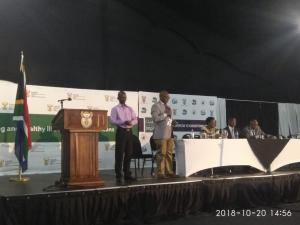South Africa holds a Presidential Health Summit to guide policy reforms towards Universal Health Coverage
As part of the South African Government’s commitment for ensuring Universal Health Coverage (UHC), draft National Health Insurance (NHI) Bill was recently passed by the cabinet; the goal of the bill is to facilitate health systems and financing reforms towards enhanced access to quality health services without financial hardship in the country.
As a demonstration of the highest level political leadership for UHC, the President of South Africa hosted the ‘Presidential Health Summit’ on the 19th and 20th October 2018 in Johannesburg. The purpose of the Summit was to engage with stakeholders to deliberate on the challenges in the health sector and to collectively define the roadmap for South Africa’s journey towards UHC with the NHI as entry point.
The specific objectives of this Summit were to:
- engage with stakeholders on the current health situation and proposed legislative and regulatory reforms and actions to achieve universal health coverage and improve good quality health care;
- broaden consensus and increase engagement around the core principles of the National Health Insurance (NHI);
- advance collective efforts to promote good health care as essential foundation to health for all; and
- strengthen co-ordination, monitoring and evaluation; improve accountability and transparency
The Summit brought together nearly 600 delegates from: office of the president; national and provincial departments of health, national department of planning monitoring and evaluation and national treasury; UN agencies; academia; NGOs; civil society; the private health sector; and various labour unions. The two day Health Summit saw high levels of political leadership and participation including from Honourable Deputy President, Health Minister and Ministers from Labour, Information Technology and Provincial levels.
This Summit provided an unprecedented opportunity for the key stakeholders in country to exchange views on ways and means through which the South African healthcare system can be significantly improved to attain UHC. There were presentations in the opening session, followed by consultative workshops in nine Commissions. In the closing session, feedback was received from the nine commissions and outcome of the summit articulated and consensus reached on the ways forward including strategic actions towards implementation of the NHI. Indeed all stakeholders unanimously agreed on the need for NHI and a unified health system that serves as means to achieve Universal health Coverage in South Africa. Also it was agreed that a Presidential Health Compact be developed to include a plan and practical steps for implementation of the proposed recommendations from the commissions.
Picture 1: Dr Tedros A Ghebreyseus Director general, WHO sharing video message with the participants of the Presidential Health Summit, during opening session |
Picture 2: Dr Joe Kutzin- Coordinator Health Financing, WHO presenting the international experience in health financing for UHC during opening session |
The World Health Organization provided leadership and technical support to the Presidency and the National Department of Health in the successful organization of Presidential health Summit. During the opening session, a keynote address via video message by was received from Dr Tedros Ghebreyesus, WHO DG. Also Dr Joe Kutzin, Coordinator Health financing, WHO HQ, made a presentation on “International experiences and lessons in health financing and systems performance”- the presentation was well received and served as reference point in the discussions during the summit.
WHO was well represented and all three levels provided technical and operational support for the successful organization and conduct of the Presidential Health summit. Other members of the WHO team at the summit were: Dr Akpaka Kalu, WHO Representative to South Africa; Dr Grace Kabaniha, Health Economist Regional office for Africa; and Dr Rajesh Narwal, Health Systems Advisor in the South Africa country office; and Mr Pallav Bhatt, Health Economist in the WHO-South Africa country office. The WHO team participated actively the discussions and provided critical inputs to the nine Commissions covering wide ranging health system components;
- Human resources (health workforce)
- Supply chain management, medical products, equipment and machinery
- Infrastructure plan
- Private sector engagement
- Health service provision (delivery)
- Public sector financial management
- Leadership and governance
- Community engagement
- Information systems
Dr Akpaka Kalu, WHO Representative to South Africa presents the Summary outcomes of the Presidential health Summit in presence of the Deputy President Mr David Mabuza and Health Minister- Dr Aaron Matsoaledi
Addressing the concluding session of the Summit, WHO Representative in South Africa, Dr Akpaka Kalu, recapitulated the summary of outcomes from the work of the nine Commissions. He congratulated the Government of South Africa for holding such high level summit on UHC, called for strategic focus on the core SDG principles of leave no one behind, inclusivity and multi-sectorial action towards UHC, and reiterated WHO’s commitment to support the National Department of Health and the Presidency in implementation of the outcome of the Summit.
Deputy President Mr David Mabuza in his closing remarks acknowledged WHO’s support and mentioned “We are fortunate in that we are not alone in many of the challenges we face. The lessons we have learnt from the World Health Organization among others are instructive as we plan our version of universal health coverage.”
Emerging from this Summit, a compact will be developed among all key stakeholders, including government, health providers, academics, health system users, Labour, private sector and civil society. This compact will provide guidance and assist in the implementation of critical tasks, such as updating the quality improvement plans, development of HRH operational plan, financing model for NHI as well as infrastructure upgradation for health facilities to facilitate the roll out of NHI in the next phase of implementation. “May this be the beginning of a rich and fulfilling journey towards a transformed, accessible, equitable and quality health care system in South Africa.” Deputy. President Mr Mabuza concluded
WHO will continue to support and work collaboratively with the President’s office and National Department of Health in development and implementation of the compact and other systems strengthening initiatives aimed at Universal Health Coverage.

